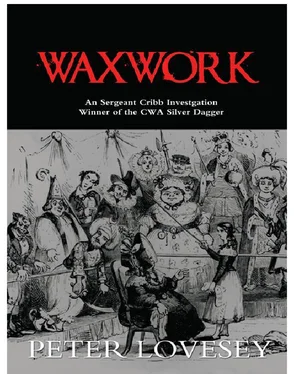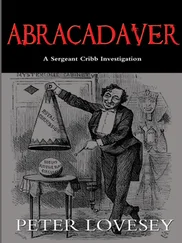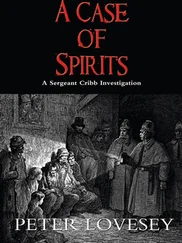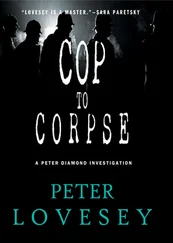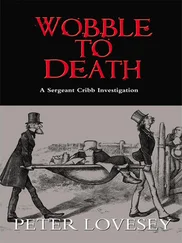Peter Lovesey - Waxwork
Здесь есть возможность читать онлайн «Peter Lovesey - Waxwork» весь текст электронной книги совершенно бесплатно (целиком полную версию без сокращений). В некоторых случаях можно слушать аудио, скачать через торрент в формате fb2 и присутствует краткое содержание. Жанр: Исторический детектив, на английском языке. Описание произведения, (предисловие) а так же отзывы посетителей доступны на портале библиотеки ЛибКат.
- Название:Waxwork
- Автор:
- Жанр:
- Год:неизвестен
- ISBN:нет данных
- Рейтинг книги:3 / 5. Голосов: 1
-
Избранное:Добавить в избранное
- Отзывы:
-
Ваша оценка:
- 60
- 1
- 2
- 3
- 4
- 5
Waxwork: краткое содержание, описание и аннотация
Предлагаем к чтению аннотацию, описание, краткое содержание или предисловие (зависит от того, что написал сам автор книги «Waxwork»). Если вы не нашли необходимую информацию о книге — напишите в комментариях, мы постараемся отыскать её.
Waxwork — читать онлайн бесплатно полную книгу (весь текст) целиком
Ниже представлен текст книги, разбитый по страницам. Система сохранения места последней прочитанной страницы, позволяет с удобством читать онлайн бесплатно книгу «Waxwork», без необходимости каждый раз заново искать на чём Вы остановились. Поставьте закладку, и сможете в любой момент перейти на страницу, на которой закончили чтение.
Интервал:
Закладка:
At the end of the passage they passed into a large room with a concrete floor. ‘Pick yourself a tub,’ Bell amiably said, ‘and get it filled with water.’
There were four tin baths hanging on hooks from the wall. Below each was a water-tap. With difficulty, because she was slightly built, the prisoner Cromer lifted one down, stood it under the tap and started the water running. Over the drumming, Bell shouted, ‘Look alive, then. Take off your things.’ She pointed to a row of cubicles facing the taps. They were open-fronted.
The wardresses stood together, waiting. It was not just a challenge to modesty. Miriam Cromer belonged to a class that differentiated itself from people like them by its pretensions to refinement. Undressing was a private activity for her kind.
She looked on the point of speaking. Her eyes met Bell’s. She turned, walked to a cubicle, removed her hat and began unfastening her velvet jacket. With that, the wardresses moved to other tasks, Hawkins opening a cupboard to select prison clothes while Bell added disinfectant to the water. ‘Buck up, won’t you?’ she said. ‘There’ll be the devil and all to pay if Miss Stones comes here and you ain’t scrubbed. For a moment just then I thought you was shy of showing your skin. I’ll warrant you’ve got nothing we haven’t seen before. Bless you, on Friday nights we have four baths on the go and eight more, naked as cuckoos, waiting. No need to be alarmed. It won’t happen to you. It all comes exclusive for your class of prisoner.’
Miriam Cromer finished unlacing and stepped out of her undergarments, frail, girlish in form and difficult to think of as a monster. Gooseflesh was forming on her limbs.
Bell gestured to her to get into the bath.
She obeyed and lowered herself quickly.
‘All over, top to tail,’ Bell instructed, handing her a bar of yellow soap. ‘Hair and all. I should have told you to unpin it first. I’ll do it for you.’
‘No,’ she said quickly. ‘I can manage.’
It was spoken as a reflex, without regard to the consequence. Had Miriam Cromer known more about prison she would have realised how rare it was for a wardress to volunteer assistance. This small assertion of independence deprived her of Bell’s sympathy from that moment on.
Acidly, the wardress said, ‘Please yourself. It doesn’t do nothing for me, you know, touching prisoners’ hair.’
Hawkins collected the prisoner’s clothes and put them one by one into a basket, examining them as if they were in a gown-shop. The chemise and drawers, pretty silk things in pale lemon trimmed with lace, she tossed aside. ‘Can’t put them away,’ she said. ‘They’ll need washing.’
When the prisoner had rinsed the soap and disinfectant from her hair as far as it was possible under the tap, she put her hands on the rim of the bath and looked to right and left. There was no towel.
Bell stood with arms folded, tacitly challenging her to ask for one to be fetched. Hawkins was still busy with the basket.
After a moment’s thought the prisoner stood upright and stepped out of the bath on to the concrete, watched by Bell. She stooped and dragged the bath to a drain in the centre of the floor and tipped away the water. She replaced the bath on its hook. Then she stood, panting from the effort, facing the wardress, her hands hanging loose at her sides, resisting the impulse to modesty. The breathlessness turned to shivering, but she said not a word, simply looked at Bell as she had looked at the judge, without shame or fear in her eyes.
Bell spoke first, conceding a small victory to the prisoner. ‘There you are, then. No different in your skin from the rest of us. Better get yourself dry. Don’t want to catch your death-’ She stopped in mid-sentence, smiled to herself, opened a cupboard and pulled out a towel. It was coarse and far from clean. The prisoner took it and used it.
Hawkins gave her a grey cotton garment, a sort of wrap-overdressing gown, and told her to sit in the cubicle. ‘You have to be seen by the doctor,’ she explained. ‘Weighed, measured, all those things. Regulations. When that’s done, we’ll get you some prison clothes.’
‘What will happen to my own things?’
‘Miss,’ Bell said with a glare. ‘If you want to speak to an officer, Cromer, address her in the proper fashion.’
‘I’m sorry. I forgot.’ A flat statement, neither repentant nor defiant. ‘Will they be returned to my husband, miss?’
‘No. They must be kept here. You’ll be permitted to wear them again’-Bell paused-‘at the end.’
A moment’s silence.
‘I see. And after that?’
‘You don’t have to worry, do you?’
‘I should like to know if they are returned to my husband, miss.’
In a hard, tight voice, Bell said, ‘I can tell you that they are not. Regulations. But if you suppose they come to any of us, you are wrong. For your peace of mind, I suggest you inquire no further, Cromer.’
WEDNESDAY, 13th JUNE
Detective Sergeant Cribb stood in his sitting-room facing the clock, flexing the muscles of his legs. He was due for a visit from Chief Inspector Jowett. It was not by invitation. The Police Code stipulated ‘An Inspector is to visit, at least once a month, the lodgings of all sergeants and constables who do not live in Section Houses, to ascertain that the places are fit to reside in, and that there is not any circumstance which makes it improper for the sergeant or constable to live in the house.’ Jack Ottway, the local Inspector for M Division, usually came, drank two cups of tea, and left without moving out of the scullery.
This time, unaccountably, it was to be Jowett. Cribb had received the news an hour ago in a curt memorandum that arrived at Divisional Headquarters in Blackman Street by the last despatch cart from the Yard. Mystified, he had come home to prepare. Jowett was a big pot now, a Chief Inspector, on three hundred a year. He should have more important things to do than grubbing round men’s homes.
Ten years before, when they had served together at Stoke Newington, Jowett had been a regular infliction. He would comb the place for signs of damp and vermin while Cribb looked on, red-eyed with resentment. Really nothing personal was intended. Jowett simply treated the Code as an article of faith. By championing it he expected to be chosen for higher things. It had not failed him. He had gone from Second Class Inspector to First Class within a year. They had given him an office of his own at the Yard. And a telephone-set. Now he was one of only three Chief Inspectors in the C.I.D. While Cribb remained a sergeant.
The Code told him why. ‘Any officer who wishes for early advancement has frequent opportunities of attracting the notice of his superiors by some action evidencing zeal, ability and judgment, by strict attention to duty, sobriety and a smart appearance, and respectful demeanour.’ Cribb’s conduct satisfied each condition but the last. His demeanour was not respectful. Too often he had made it plain that he could not abide Jowett. That impediment to promotion should have been removed when Jowett took up his position at the Yard, but Jowett would not let him alone. Now, not content with calling him to the Yard each time a problem landed on his desk, he was coming out to Bermondsey to persecute him in his home.
A movement caught his eye. Only the cat, standing up to stretch. He envied its repose. Cribb’s was a restless temperament. It showed in his physique. Fifty now, his hair more grey than black, he was as lean as he had been on the parade-ground at Canterbury in his army days. And practically as fit. He had been stopped a shilling for a day’s sickness perhaps a dozen times in his career, no more. Occasionally he begrudged the Yard his diligence, yet he could no more change it than his nose, which was worthy of an Indian chief. Sharp, too, in speech, quick to spot deceit, his sense of irony kept him tolerant of others in most situations. He often fumed, rarely erupted.
Читать дальшеИнтервал:
Закладка:
Похожие книги на «Waxwork»
Представляем Вашему вниманию похожие книги на «Waxwork» списком для выбора. Мы отобрали схожую по названию и смыслу литературу в надежде предоставить читателям больше вариантов отыскать новые, интересные, ещё непрочитанные произведения.
Обсуждение, отзывы о книге «Waxwork» и просто собственные мнения читателей. Оставьте ваши комментарии, напишите, что Вы думаете о произведении, его смысле или главных героях. Укажите что конкретно понравилось, а что нет, и почему Вы так считаете.
